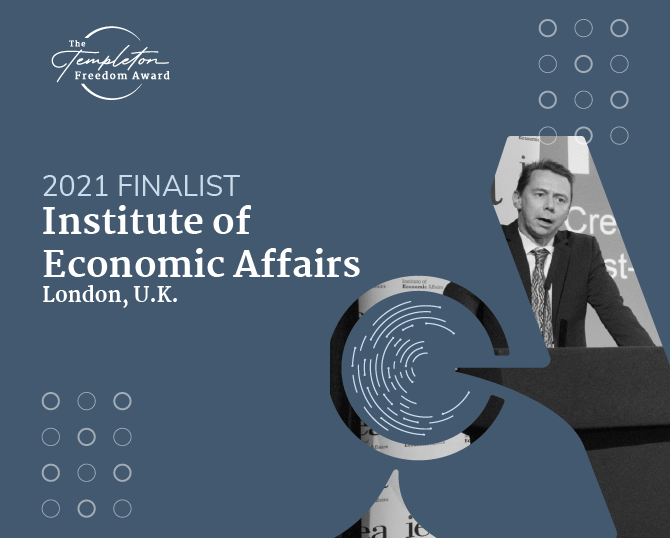Institute of Economic Affairs’ free trade initiative named a finalist for 2021 Templeton Freedom Award
- Date:

Forty years ago, the Institute of Economic Affairs (IEA) laid the intellectual groundwork for sustained economic expansion across the United Kingdom, and today they have once again helped to lead the country out of crisis. When the Brexit referendum ushered in a period of uncertainty, the IEA worked to make the most of the opportunity to redefine economic policy in the United Kingdom. They played a significant role in changing hearts, minds, and policy with a clear vision for advancing free trade.
The IEA team’s “Plan A+” program was covered widely across the media. It was championed by a wide range of UK policymakers and leaders, who have since implemented dozens of free-trade deals worth over US$1 trillion. Overcoming immense opposition from regulatory agencies, social media attacks, and even targeted burglaries, the IEA’s efforts culminated in one of the Institute’s most monumental policy contributions in its 66-year history. Their steadfast commitment to open trade has helped secure a more prosperous future for the people of the United Kingdom, rekindled Britain’s deep liberal tradition, and created a model to be emulated around the world.
“The Templeton Freedom Award has a long and prestigious history of honoring the world’s leading classical liberal think tanks,” said Mark Littlewood, IEA Director General. “The half-decade since the Brexit referendum has been arguably one of the most important periods in British trading history. Against the odds, and after years of hard work and immense challenges, the IEA has been successful in helping ensure the UK adopted a comprehensive free-trade agreement with the EU, as well as agreements with dozens of countries worldwide—an exciting step towards the UK once again becoming the global pioneer of free trade. It is an immense privilege for the IEA to be recognized for this achievement, and to be named a finalist for the Templeton Freedom Award.”
This revival of free trade was far from a foregone conclusion when the Brexit referendum resulted in a “Leave” decision five years ago. Powerful forces in government and civil society organizations were poised to push for a more protectionist trade policy—which risked squandering the opportunity presented by Brexit, regardless of what one thought of the referendum. The Institute for Economic Affairs took no corporate view on “Leave” versus “Remain,” but it saw the referendum’s results as a critical moment that would decide the United Kingdom’s future.
The IEA set their sights on becoming the central voice in ensuring that the United Kingdom took steps to open itself to trade. The U.K. was once a champion of free trade, and the IEA wanted to make it so again. To lay the groundwork for their project, they launched a series of publications. The series focused on the core of the IEA’s effort—“Plan A+”. This plan put forward a vision for a truly free-trade U.K. with the promise of more prosperity for more people—and an alternative to the various mixed-bag legislation proposed by Members of Parliament. Plan A+ was supported by a variety of research reports and briefing papers that addressed criticism and provided a strong foundation of supporting evidence.
The IEA met directly with key figures of influence and authority to explain the message of unfettered trade and how it would benefit the United Kingdom. They also worked to educate the public more broadly, using articles, podcasts, videos, and a speaking tour.
Working against incredible opposition, and after years of hard work, the Institute of Economic Affairs achieved a stunning victory. Backed by Prime Minister Boris Johnson’s administration, the IEA’s Plan A+ informed the U.K. government’s approach to post-Brexit trade. Free trade deals with the European Union and 66 other countries, including seven in a single week, have been signed to date. Many of these deals are much more free than those that were in place while the U.K. was a part of the EU, and the number of imports without tariffs has nearly doubled. The prime minister has supported the IEA’s vision of free trade in no uncertain terms, and Littlewood was invited to join the government’s Strategic Trade Advisory Group as a trade expert.
With deals amounting to over US$1 trillion and a firm commitment to trade from the highest levels of government, the UK’s future is bright—thanks to the Institute of Economic Affairs. But the benefits of the IEA’s work will be felt far beyond Britain’s borders: as an important global economic power positions itself as a champion of free trade, millions across the world stand to flourish.
About Institute of Economic Affairs:
The mission of the Institute of Economic Affairs is to improve understanding of the fundamental institutions of a free society by analyzing and expounding the role of markets in solving economic and social problems.
About Atlas Network:
Atlas Network increases global prosperity by strengthening a network of independent partner organizations that promote individual freedom and are committed to identifying and removing barriers to human flourishing.
About Atlas Network’s Templeton Freedom Award and the additional 2021 finalists:
Awarded since 2004, Atlas Network’s Templeton Freedom Award is named for the late investor and philanthropist Sir John Templeton. The award annually honors his legacy by identifying and recognizing the most exceptional and innovative contributions to the understanding of free enterprise and the public policies that encourage prosperity, innovation, and human fulfillment via free competition. The award is generously supported by Templeton Religion Trust and will be presented during Atlas Network’s Freedom Dinner on December 14 in Miami, Florida, at loanDepot (Miami Marlins) park. The winning organization will receive a $100,000 prize, and five additional finalists will each receive $20,000 prizes. The finalists for Atlas Network’s 2021 Templeton Freedom Award are:
Cato Institute (Washington, D.C.), for their work to eliminate qualified immunity;
Libertas Institute (Lehi, Utah), for their regulatory sandbox project;
Institute of Economic Affairs (London, U.K.), for their work to foster free trade in the United Kingdom.